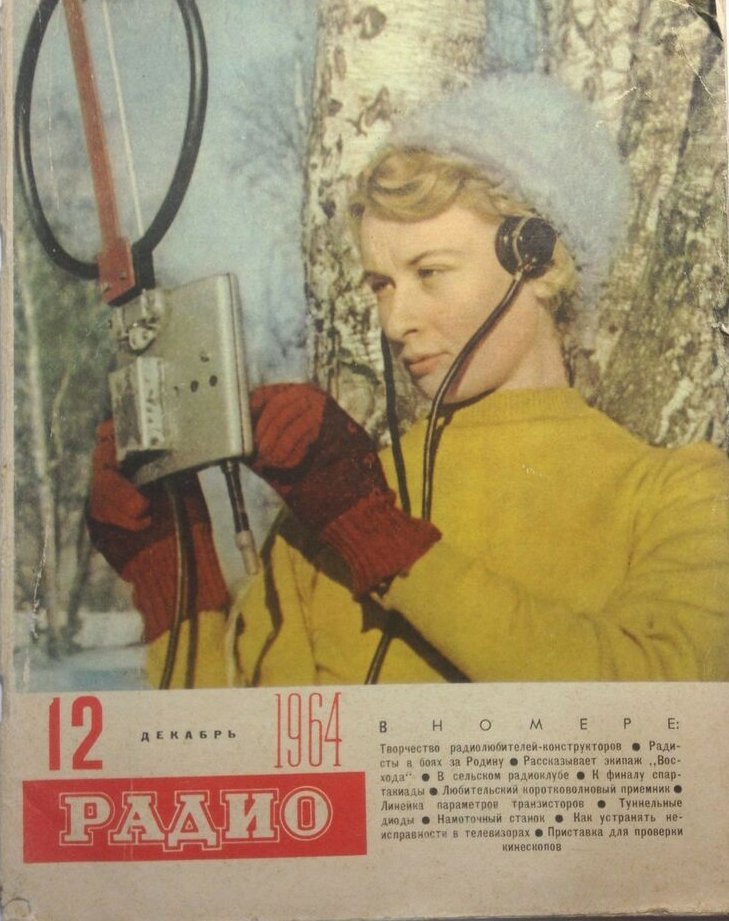Justice in the Wilderness
Some have asked for my review of the book. Follow the thread only if you are interested
I dont want to bore anyone unnecessarily 😊
Truth can be uncomfortable but we need to hear it in order to move forward
And i believe TT has been very frank in his book & to truly appreciate it, one has to put aside sensitivities & listen
If we truly care for our country it is critical that we give it serious considerations
He related all his major works in the book and perhaps this is the most facinating part of the memoir
Losing him as an AG was a great loss especially many issues that he was working on was still underway
All the publicity on some excerpts were out of context. You need to read the whole book to gain deeper understanding
More from Culture
I just finished Eric Adler's The Battle of the Classics, and wanted to say something about Joel Christiansen's review linked below. I am not sure what motivates the review (I speculate a bit below), but it gives a very misleading impression of the book. 1/x
The meat of the criticism is that the history Adler gives is insufficiently critical. Adler describes a few figures who had a great influence on how the modern US university was formed. It's certainly critical: it focuses on the social Darwinism of these figures. 2/x
Other insinuations and suggestions in the review seem wildly off the mark, distorted, or inappropriate-- for example, that the book is clickbaity (it is scholarly) or conservative (hardly) or connected to the events at the Capitol (give me a break). 3/x
The core question: in what sense is classics inherently racist? Classics is old. On Adler's account, it begins in ancient Rome and is revived in the Renaissance. Slavery (Christiansen's primary concern) is also very old. Let's say classics is an education for slaveowners. 4/x
It's worth remembering that literacy itself is elite throughout most of this history. Literacy is, then, also the education of slaveowners. We can honor oral and musical traditions without denying that literacy is, generally, good. 5/x
As someone\u2019s who\u2019s read the book, this review strikes me as tremendously unfair. It mostly faults Adler for not writing the book the reviewer wishes he had! https://t.co/pqpt5Ziivj
— Teresa M. Bejan (@tmbejan) January 12, 2021
The meat of the criticism is that the history Adler gives is insufficiently critical. Adler describes a few figures who had a great influence on how the modern US university was formed. It's certainly critical: it focuses on the social Darwinism of these figures. 2/x
Other insinuations and suggestions in the review seem wildly off the mark, distorted, or inappropriate-- for example, that the book is clickbaity (it is scholarly) or conservative (hardly) or connected to the events at the Capitol (give me a break). 3/x
The core question: in what sense is classics inherently racist? Classics is old. On Adler's account, it begins in ancient Rome and is revived in the Renaissance. Slavery (Christiansen's primary concern) is also very old. Let's say classics is an education for slaveowners. 4/x
It's worth remembering that literacy itself is elite throughout most of this history. Literacy is, then, also the education of slaveowners. We can honor oral and musical traditions without denying that literacy is, generally, good. 5/x
This thread examining a detrans story puts me in mind of something that shocked me to the core fifteen years ago in early 2004. I’ve not often told this so there follows a mini thread of my own.
This time in 2004 was very sensitive. Our little team at Press for Change was carefully helping to support the government to get the Gender Recognition Bill through its parliamentary stages. It had already started in the Lords and faced a committee stage with evangelical-backed..
..opposition facing the government’s Bill minister Lord Filkin and and others from all parties supporting him. The heavy lifting of daily liaison work was handled on our side by my colleague Claire @2legged whose back room lobby efforts should never go unacknowledged in any..
..account of events. Our political backdrop was a small but determined effort by two evangelical groups touting very familiar lies about trans people and, perhaps more worrying, a couple of contemporary journalists (one a Guardian staffer and one a freelance) determined to tout..
..detransition scare stories as a way to perhaps cast doubt over formalising a legal recognition process. The thing that was obvious at the time was that their stories relied on constant recycling of the same 10-12 case stories, which they had discovered because they were the..
Found a podcast by Keira Bell talking about her reasons for detransitioning
— Lux \U0001f3f3\ufe0f\u200d\U0001f308 (@Lux_fae) February 2, 2021
Listened to it so you don't have to
Wherein, at the 24-30 min mark, keira talks about her reasons for detransition and admits she did it for her ideology alone.
Thread:
This time in 2004 was very sensitive. Our little team at Press for Change was carefully helping to support the government to get the Gender Recognition Bill through its parliamentary stages. It had already started in the Lords and faced a committee stage with evangelical-backed..
..opposition facing the government’s Bill minister Lord Filkin and and others from all parties supporting him. The heavy lifting of daily liaison work was handled on our side by my colleague Claire @2legged whose back room lobby efforts should never go unacknowledged in any..
..account of events. Our political backdrop was a small but determined effort by two evangelical groups touting very familiar lies about trans people and, perhaps more worrying, a couple of contemporary journalists (one a Guardian staffer and one a freelance) determined to tout..
..detransition scare stories as a way to perhaps cast doubt over formalising a legal recognition process. The thing that was obvious at the time was that their stories relied on constant recycling of the same 10-12 case stories, which they had discovered because they were the..
You May Also Like
The UN just voted to condemn Israel 9 times, and the rest of the world 0.
View the resolutions and voting results here:
The resolution titled "The occupied Syrian Golan," which condemns Israel for "repressive measures" against Syrian citizens in the Golan Heights, was adopted by a vote of 151 - 2 - 14.
Israel and the U.S. voted 'No' https://t.co/HoO7oz0dwr
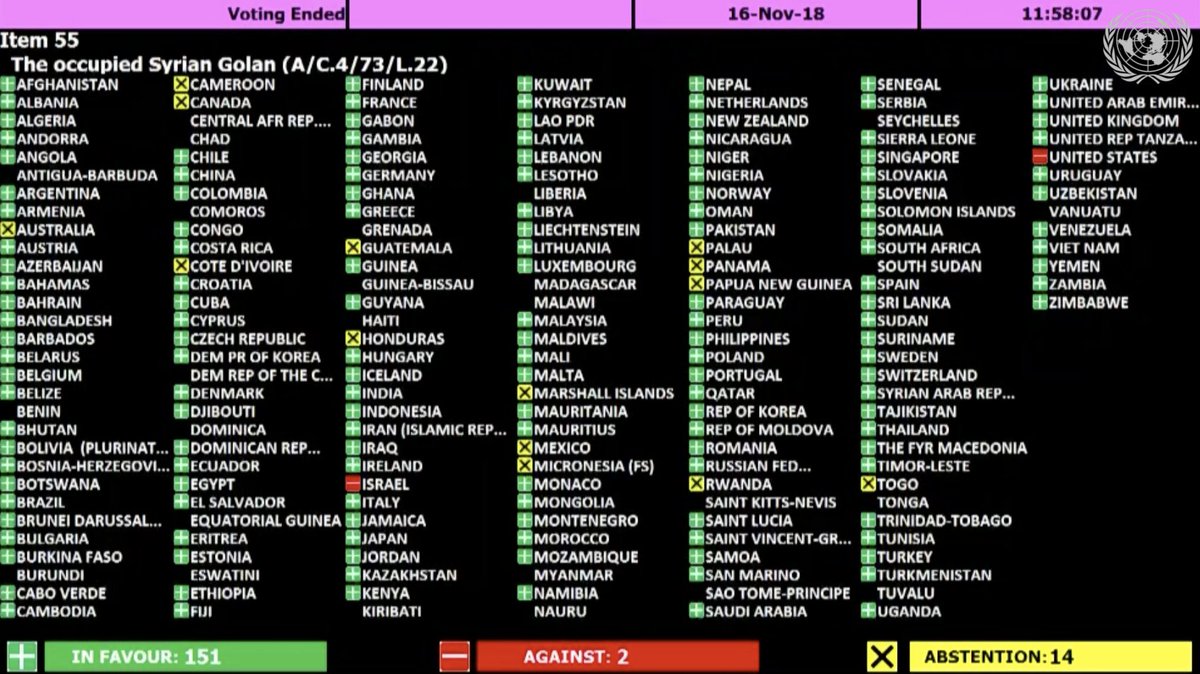
The resolution titled "Israeli practices affecting the human rights of the Palestinian people..." was adopted by a vote of 153 - 6 - 9.
Australia, Canada, Israel, Marshall Islands, Micronesia, and the U.S. voted 'No' https://t.co/1Ntpi7Vqab
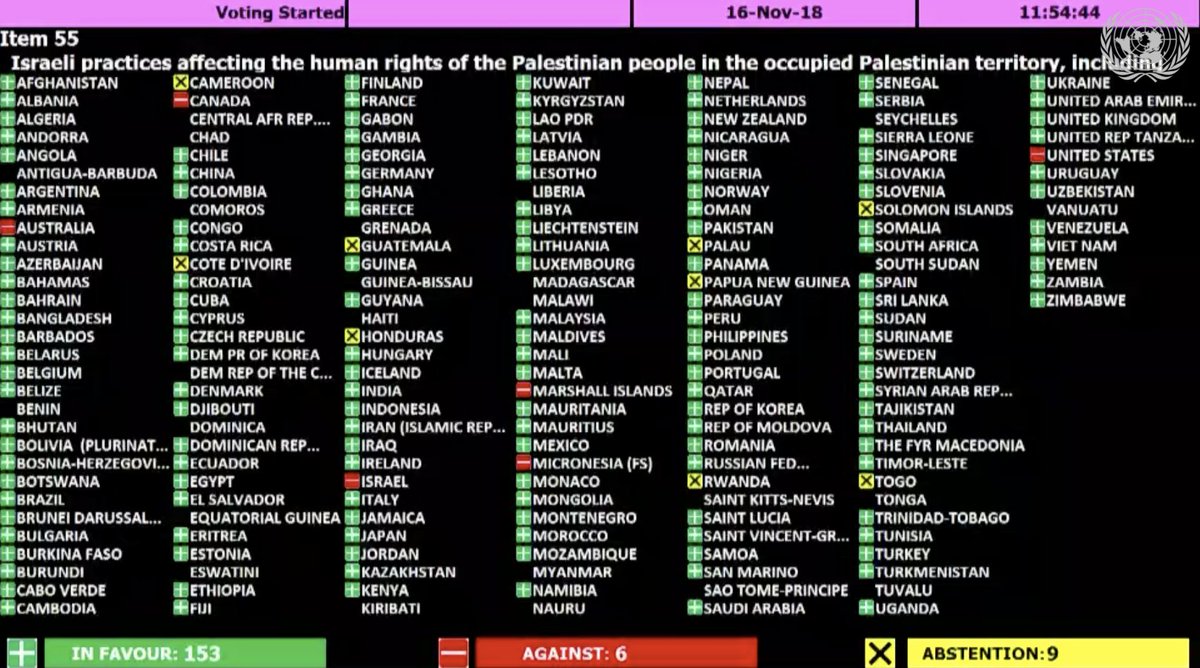
The resolution titled "Israeli settlements in the Occupied Palestinian Territory, including East Jerusalem, and the occupied Syrian Golan" was adopted by a vote of 153 – 5 – 10.
Canada, Israel, Marshall Islands, Micronesia, and the U.S. voted 'No'
https://t.co/REumYgyRuF
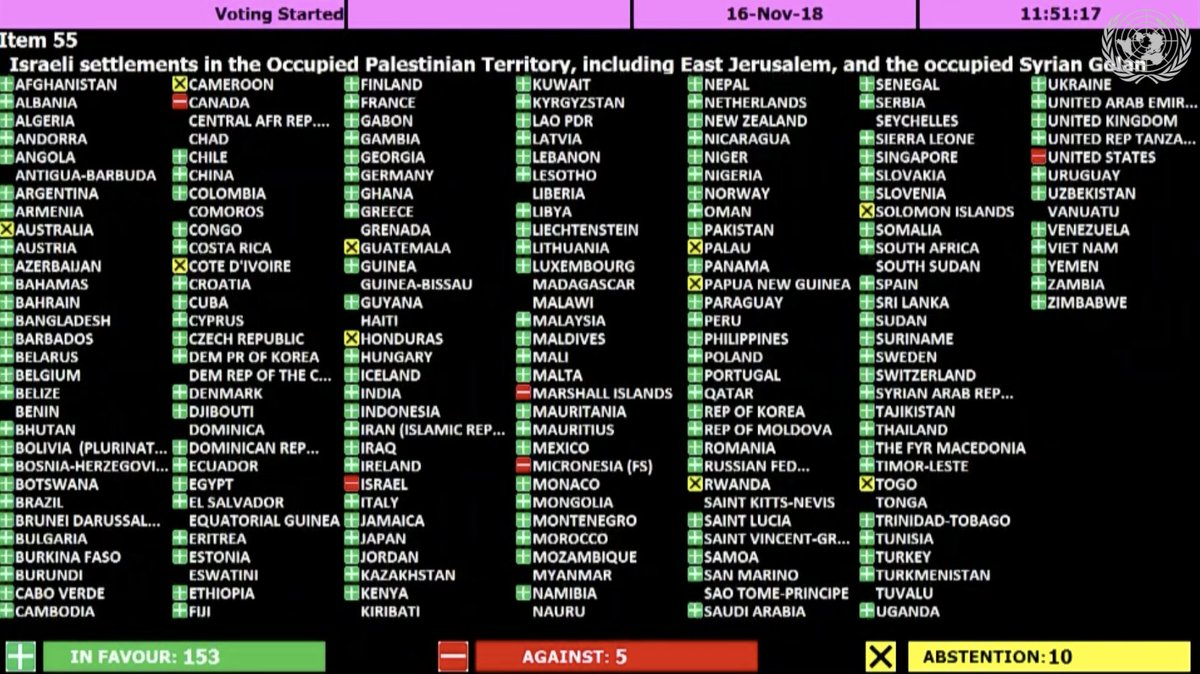
The resolution titled "Applicability of the Geneva Convention... to the
Occupied Palestinian Territory..." was adopted by a vote of 154 - 5 - 8.
Canada, Israel, Marshall Islands, Micronesia, and the U.S. voted 'No'
https://t.co/xDAeS9K1kW
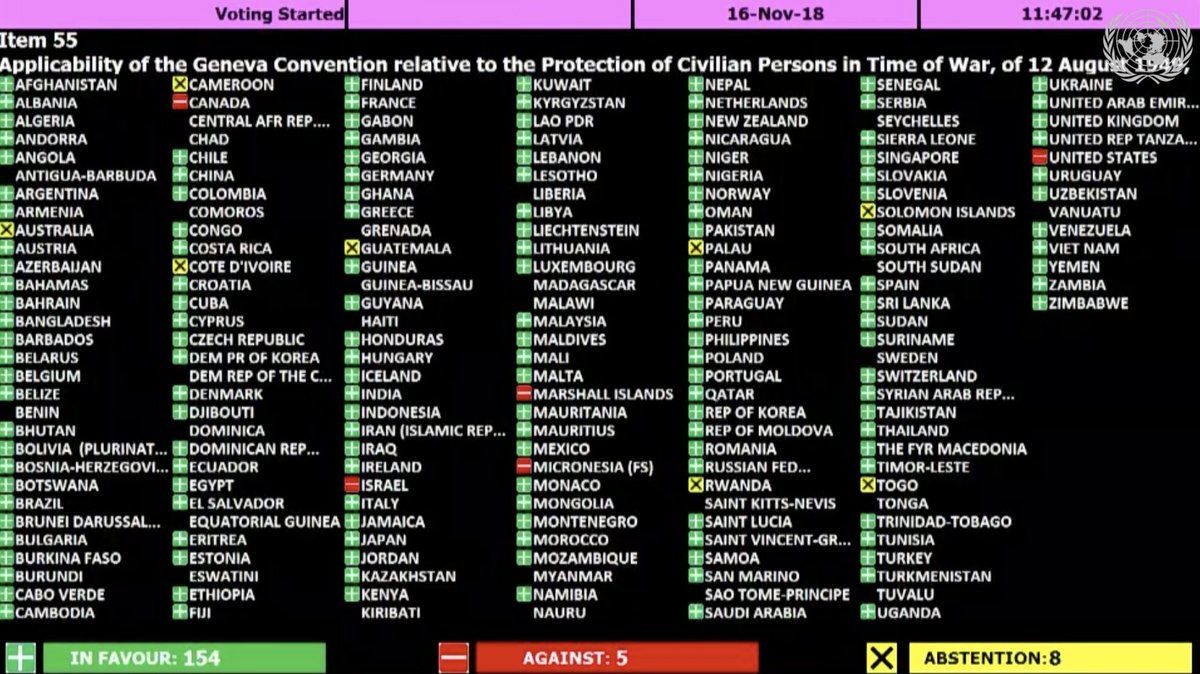
View the resolutions and voting results here:
The resolution titled "The occupied Syrian Golan," which condemns Israel for "repressive measures" against Syrian citizens in the Golan Heights, was adopted by a vote of 151 - 2 - 14.
Israel and the U.S. voted 'No' https://t.co/HoO7oz0dwr

The resolution titled "Israeli practices affecting the human rights of the Palestinian people..." was adopted by a vote of 153 - 6 - 9.
Australia, Canada, Israel, Marshall Islands, Micronesia, and the U.S. voted 'No' https://t.co/1Ntpi7Vqab

The resolution titled "Israeli settlements in the Occupied Palestinian Territory, including East Jerusalem, and the occupied Syrian Golan" was adopted by a vote of 153 – 5 – 10.
Canada, Israel, Marshall Islands, Micronesia, and the U.S. voted 'No'
https://t.co/REumYgyRuF

The resolution titled "Applicability of the Geneva Convention... to the
Occupied Palestinian Territory..." was adopted by a vote of 154 - 5 - 8.
Canada, Israel, Marshall Islands, Micronesia, and the U.S. voted 'No'
https://t.co/xDAeS9K1kW






